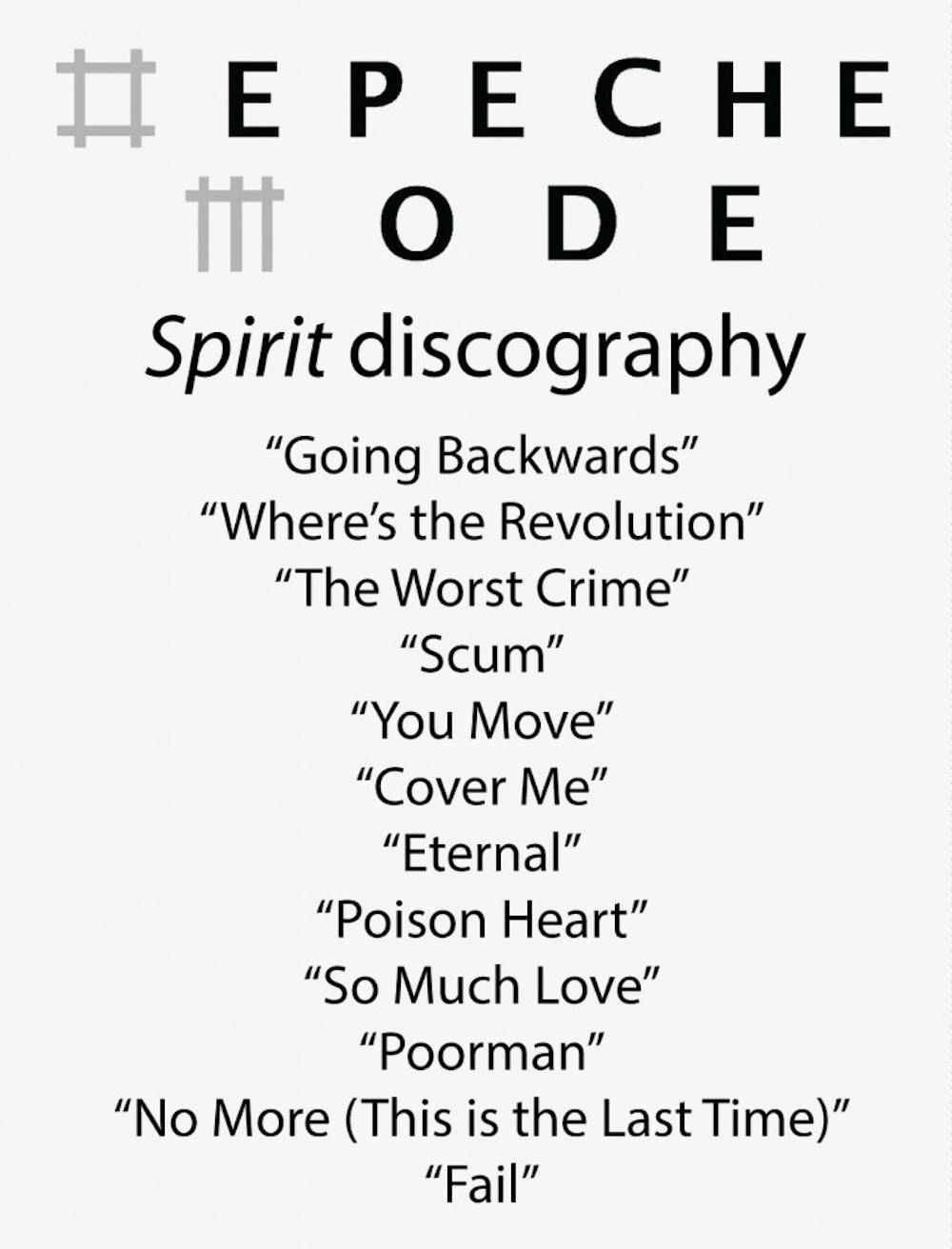Depeche Mode has never shied away from dealing with tough topics. While the band might be primarily known for its dance hit “Just Can’t Get Enough,” Depeche Mode has managed to keep up a pop beat without abandoning the intense philosophical and political undertones present in their lyrics. Since the early ’80s, the band has consistently produced music without failing their fan base.
This legacy continues in their most recent album “Spirit,” which came out Friday. “Spirit,” wrought with emotional intensity, appeals to the same demographic to which Depeche Mode has always catered: the angst-ridden adolescents of the ’80s and, now, their angst-ridden adolescent kids.
Depeche Mode stems from the same era as dance-pop popularized by artists like Madonna and Wham! — and let’s face it, the band had its witty, radio-ready moments, such as “Never Let Me Down Again.” But perhaps because their particular moment in the world of John Hughes-style coming-of-age has passed, the band has turned from playing emphatically ’80s new wave synth-pop tunes to using its music to make straightforward calls to action.
The band’s earlier work — exemplified by its indignant 1990 album “Violator” — undoubtedly spoke to the darker aspects of interpersonal relationships. But these songs did not have the political implications prevalent in Depeche Mode’s latest release.
Somewhat ironically, the album starts with “Going Backwards,” which includes the lyrics, “Ignoring the realities / Going Backwards / Are you counting all the casualties?” Evoking protest music popular in the ’60s and ’70s, these lyrics address today’s political climate. But paired with Depeche Mode’s characteristically cluttered synthetic background, the band conveys this political angst with renewed intensity. The consistent, driving electronic beat in “Where’s the Revolution,” which was pre-released as a single in early February, enforces the overt lyrics, “Who’s making your decisions? / You or your religion / You patriotic junkies.” The lyrics of the chorus, “Where’s the revolution / Come on, people / You’re letting me down” address the listener directly and beg for a political movement. The references to “The train is coming / so get on board” are reminiscent of Cat Stevens’ “Peace Train,” an anti-war anthem. Later in “Poorman,” lead singer of Depeche Mode Dave Gahan sings, “Poor man still got the blues / He’s walking around in worn out shoes / With nothing to lose” to elicit the same imagery of Janis Joplin or Bob Dylan while creating a distinct framework to approach recent events with synthetic musical strength.
As the album continues, the political messages become less focused, but the lyrics address personal issues with the same potent intensity. The song “You Move” approaches a lighter theme, offering lyrics like “Let me be your man” and “I like the way you move,” but doesn’t sacrifice the album’s consistent tone of melancholy and resentment — “We don’t have that life no more.” The song “Poison Heart” also addresses a romantic relationship but with an outright accusatory tone that feels almost political through the repetition of, “You know we have to break up / You’ll always be alone.” In the context of the larger album, this seems to indicate that in today’s political landscape, it comes as no surprise that the singer’s partner has “poison in (their) heart.” The song “So Much Love” recalls the band’s 1990 hit “Personal Jesus” with its persistent, repetitive, “You can forsake me,” again juxtaposing romance and religious imagery to create a poignant lyrical framework for approaching relationships.
With the success of “Spirit,” Depeche Mode has avoided falling into the trap of former pop musicians attempting a comeback. It has consistently continued to produce music since its 1980 debut. More importantly, the band has adjusted its sound without sacrificing its distinct place in the genre of electronic rock. On top of that, the band vehemently addresses contemporary issues. For better or worse, the ephemeral rock movement linking disco and grunge — defined by bands like New Order, the Pet Shop Boys and the Cure — has permanently infiltrated the music landscape.





